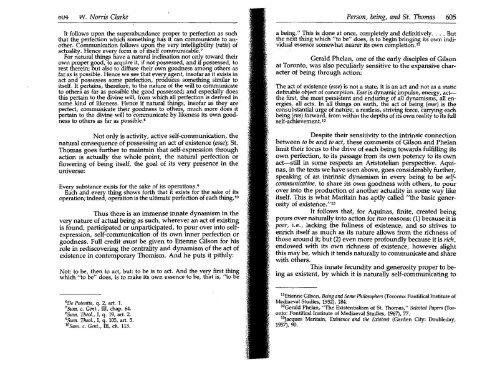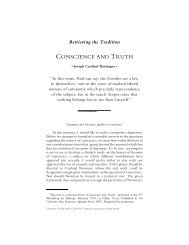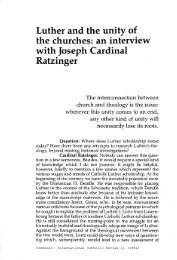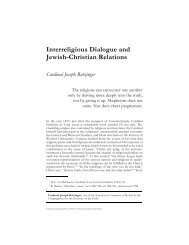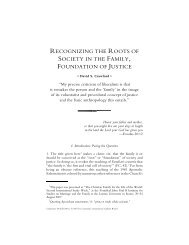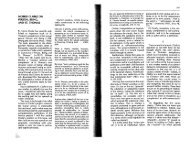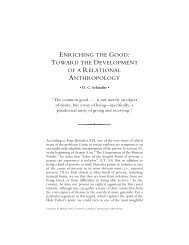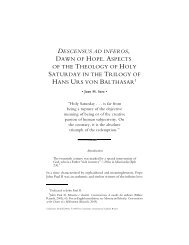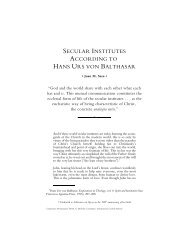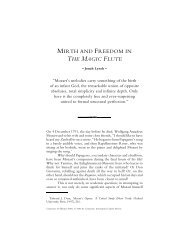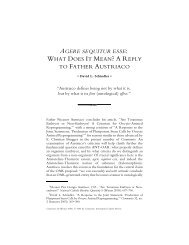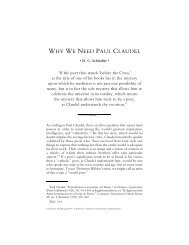W. Norris Clarke. Person, Being, and St. Thomas. Communio 19 ...
W. Norris Clarke. Person, Being, and St. Thomas. Communio 19 ...
W. Norris Clarke. Person, Being, and St. Thomas. Communio 19 ...
You also want an ePaper? Increase the reach of your titles
YUMPU automatically turns print PDFs into web optimized ePapers that Google loves.
u4 W. <strong>Norris</strong> <strong>Clarke</strong><br />
It follows upon the superab~ndance proper to perfection as such<br />
that the perfection which something has it can communicate to another.<br />
Communication follows u on the very intelligibility (ratio) of<br />
actuality. Hence eve form is o ? itself communicable.7<br />
For natural things?ave a natoral inclination not on1 toward their<br />
own roper ood, to acquire it, if not possessed, <strong>and</strong> 2 ' possessed, to<br />
rest tRerein;%ut also to diffuse their own goodness among others as<br />
far as is possible. Hence we see that every agent, insofar as it exists in<br />
act <strong>and</strong> possesses some perfection, produces something similar to<br />
itself. It pertains, therefore, to the nature of the will to communicate<br />
to others as far as ossible the good ossessed; <strong>and</strong> especially does<br />
this pertain to the {vine will, from wLch all perfection is denved in<br />
some kind of likeness. Hence if natural things, insofar as they are<br />
perfect, communicate their goodness to others, much more does it<br />
pertain to the divine will to communicate by likeness its own goodness<br />
to others as far as possible.8<br />
Not only is activity, active self-communication, the<br />
natural consequence of possessing an act of existence (esse); <strong>St</strong>.<br />
<strong>Thomas</strong> goes further to maintain that self-expression through<br />
action is actually the whole point, the natural perfection or<br />
flowering of being itself, the goal of its very presence in the<br />
universe:<br />
Every substance exists for the sake of its operations.9<br />
Each <strong>and</strong> eve thing shows forth that it exists for the sake of its<br />
operation; indeey, operation is the ultimate perfection of each thing.10<br />
Thus there is an immense innate dynamism in the<br />
very nature of actual being as such, wherever an act of existing<br />
is found, participated or unparticipated, to pour over into self-<br />
expression, self-communication of its own inner perfection or<br />
goodness. Full credit must be given to Etienne Gilson for his<br />
role in rediscovering the centraIity <strong>and</strong> dynamism of the act of<br />
existence in contemporary Thornism. And he puts it pithily:<br />
Not: to be, then to act, but: to be is to act. And the very first thing<br />
which "to be" does, is to make its own essence to be, that is, "to be<br />
6De Potentia, q. 2, art. 1.<br />
7Sum. c. Gent., 111, chap. 64.<br />
'Sum. Theol., I, q. <strong>19</strong>, art. 2.<br />
9Sum. Theol., I, q. 105, art. 5.<br />
l0Sum. c. Gent., 111, ch. 113.<br />
,<br />
<strong>Person</strong>, being, <strong>and</strong> <strong>St</strong>. <strong>Thomas</strong> 605<br />
a being." This is done at once, completely <strong>and</strong> definitively. . . . But<br />
the next thing which "to be" does, 1s to begin bringing its own indi-<br />
vidual essence somewhat nearer its own c~mpletion.~~<br />
Gerald Phelan, one of the early disciples of Gilson<br />
at Toronto, was also peculiarly sensitive to the expansive char-<br />
acter of being through action:<br />
The act of existence (esse) is not a state, it is an act <strong>and</strong> not as a static<br />
definable object of conception. Esse is dynamic impulse, energy, actthe<br />
first, the most persistent <strong>and</strong> enduring of all d namisms, all energies,<br />
all acts. In all things on earth, the act of being (esse) is the<br />
consubstantial urge of nature, a restless, striving force, carrying each<br />
being ens) forward, from within the depths of its own reality to ~ts full<br />
self-ac L evement.12<br />
Despite their sensitivity to the intrinsic connection<br />
between to be <strong>and</strong> to act, these comments of Gilson <strong>and</strong> Phelan<br />
limit their focus to the drive of each being towards fulfilling its<br />
own perfection, to its passage from its own potency to its own<br />
act-still in some respects an Aristotelian perspective. Aqui-<br />
nas, in the texts we have seen above, goes considerably further,<br />
speaking of an intrinsic dynamism in every being to be self-<br />
communicative, to share its own goodness with others, to pour<br />
over into the production of another actuality in some way like<br />
itself. This is what Maritain has aptly called "the basic gener-<br />
osity of existence."l3<br />
It follows that, for Aquinas, finite, created being<br />
pours over naturally into action for two reasons: (1) because it is<br />
poor, i.e., lacking the fullness of existence, <strong>and</strong> so strives to<br />
enrich itself as much as its nature allows from the richness of<br />
those around it; but (2) even more profoundly because it is rich,<br />
endowed with its own richness of existence, however slight<br />
this may be, which it tends naturally to communicate <strong>and</strong> share<br />
with others.<br />
This innate fecundity <strong>and</strong> generosity proper to be-<br />
ing as existent, by which it is naturally self-communicating to<br />
"Etienne Gilson, <strong>Being</strong> <strong>and</strong> Some Philosophers (Toronto: Pontifical Institute of<br />
Mediaeval <strong>St</strong>udies, <strong>19</strong>52), 184.<br />
12Gerald Phelan, "The Existentialism of <strong>St</strong>. <strong>Thomas</strong>," Selected Papers (Tor-<br />
onto: Pontifical Institute of Mediaeval <strong>St</strong>udies, <strong>19</strong>67), 77.<br />
13Jacques Maritain, Existence <strong>and</strong> the Existent (Garden City: Doubleday,<br />
<strong>19</strong>57), 90.


